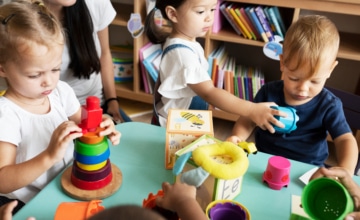Learn more about the fascinating discoveries from science that are helping professionals understand and appreciate just how well equipped babies are for relationships with their first caregiving adults.
by Kathy Reschke, Content Director, Early Childhood Workforce Innovations
No matter the age that a child enters the early education doorway, she brings with her a whole array of capabilities and experiences. With clever new research methods, scientists are finding that even very young babies have remarkable capabilities and inborn drives that uniquely suit them for the stimulating world they enter at birth. Some of the most fascinating discoveries from science are those that help professionals understand and appreciate just how well equipped babies are for relationships with their first caregiving adults.
- Visually, newborns focus most clearly on objects that are around 8–15 inches away, the distance between baby and caregiver during feeding. Also, very young babies show a strong, innate attraction to human faces and quickly come to recognize the faces of those who interact with them regularly.
- Hearing abilities develop early during pregnancy, so by the time a baby is born, he already knows and shows a preference for his mother’s voice. Young babies like to listen to language and prefer it over other sounds, including music.
- Did you know that newborns already have a keen sense of smell at birth? So keen, in fact, that they can distinguish the smell of their own mother’s breastmilk from that of another mother. It is another way that babies are designed to connect to their most important caregivers. Smell is a powerful memory enhancer, and relationships are built as positive memories are collected and shaped into meaning.
Clearly babies are born to connect! But these newborn sensory abilities are just the tip of the iceberg! Young children are primed in so many ways to grow, learn, and thrive in and through relationships. And when the educators who care for and teach them every day intentionally design their care with this knowledge in mind, they are providing young children with a solid foundation for future well-being and success. That’s why ZERO TO THREE’s Early Childhood Workforce Innovations department is focusing our attention on teacher-child interactions that benefit infants and toddlers most through new resources, training, and technical assistance. Learn more about the ZERO TO THREE Critical Competencies for Infant-Toddler Educators™ suite of products and services here.



